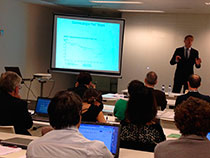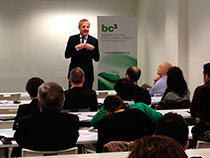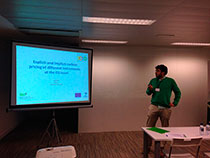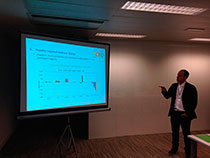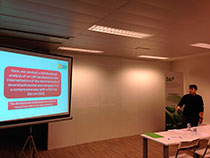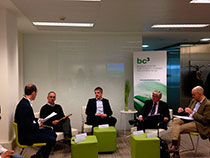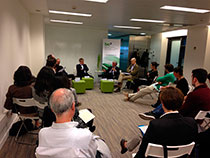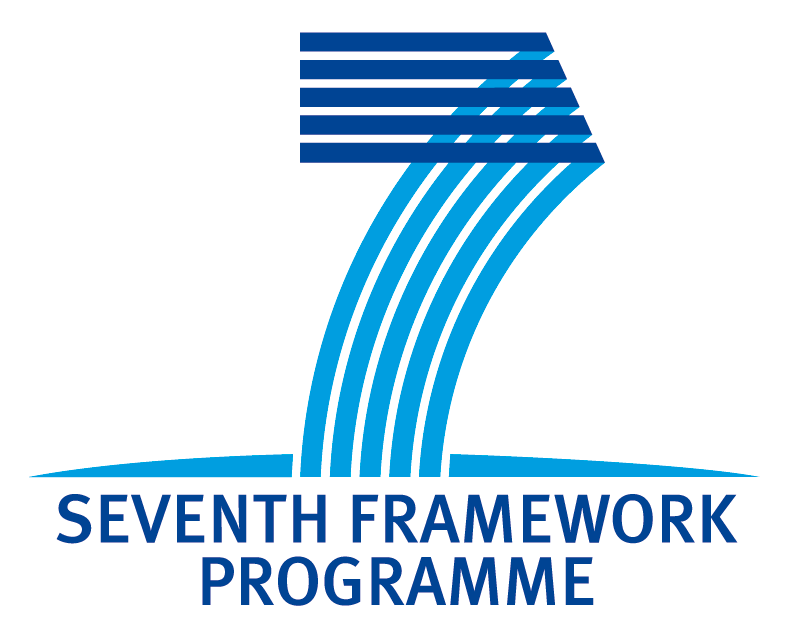
from the European Union's Seventh Framework Programme
for research, technological development and demonstration under grant agreement no 308680.


Workshop
|
23rd October 2015
|
|
The BC3, Basque Centre for Climate Change held on the 23rd of October the workshop “EU Climate Policies Towards a Low-Carbon Economy”. During this workshop the main results of the CECILIA2050 research project were presented with a focus on its ultimate goal: to assess the current EU climate policies in order to formulate near-term and medium-term policy recommendations. The following relevant questions were addressed within the workshop,
The participation was kept deliberately small with the aim of facilitating dialogue and interaction amongst workshop participants (experts from academia, government, think tanks and civil society). |
PresentationsThe presentations of the workshop are available in the following channel: |
||||||||||||||||
Acknowledgement: This project has received funding from the European Union's Seventh Framework Programme for research, technological development and demonstration under grant agreement no 308680.
|
CECILIA2050: Combining Policy Instruments to Achieve Europe's 2050 Climate Targets The EU wants to transform itself to a low-carbon economy by mid-century. This transformation process will require an overhaul of the European economy, affecting a range of sectors – not only power generation, industry and transport, but also agriculture, construction or finance. Governing this transformation process is a huge challenge – stimulating the necessary innovations, ensuring public support, encouraging the needed investments, creating the right infrastructure, and avoiding lock-in into old, carbon-intensive technologies. To manage this transformation, a range of policy instruments is required. The existing mix of climate policy instruments needs to be scaled up drastically to initiate the necessary changes. But as the scale and scope of instruments increases, it becomes more important to understand and to manage their interaction, as do constraints on the political, legal and administrative feasibility. Policy solutions that have worked well in an economic niche are not necessarily suited to guide economic development on a broad scale; instruments that have co-existed well on a small scale may conflict when scaled up to an economywide level. To evaluate their efficiency and effectiveness, policy instruments cannot be viewed in isolation; understanding and managing their interaction becomes key. The CECILIA2050 project has been set up to address this challenge: to understand how policy instruments work in interaction, what factors determine their performance, and how the European climate policy instrument mix should evolve to guide the transformation to a low-carbon economy. The project will describe ways to improve the economic efficiency and environmental effectiveness of the instrument mix, and to address constraints that limit their performance or feasibility. These include public acceptance, availability of finance and the physical infrastructure, but also the administrative and legal framework. To achieve this, the CECILIA2050 project combines a backward-looking (ex-post) and a forward-looking (ex-ante) analysis. The first, backward-looking part of the project takes stock of the existing instrument mix in the EU and its Member States, and assesses their coherence and past performance. It describes which factors determine their efficiency and effectiveness, and measures their effects on equity, innovation and competitiveness. The second, forward-looking part maps pathways towards a more ambitious policy mix for 2030 and 2050, starting from the current EU climate policy. With economic instruments at the heart of the mix, it describes and models how the instrumentation could evolve, based on scenarios of the magnitude of change required for the low-carbon transformation. To this end, it combines the state of the art modelling tools with qualitative and participatory methods. To complement the EU-level analysis, the effects of EU climate policies are quantified at the global level. To ensure policy relevance and mobilise practitioners’ knowledge, the project engages with stakeholders in different ways, through workshops, online surveys and the guidance of a Science and Policy Board of specifically selected experts. CECILIA2050 is about “Choosing Efficient Combinations of Policy Instruments for Low-carbon development and Innovation to Achieve Europe's 2050 climate targets.” It is a three-year research project funded by the European Union’s 7th Framework Programme for Research (FP7). The consortium created for the implementation of the project is comprised of ten academic institutions from eight different EU countries. It is led by Ecologic Institute from Berlin as Project Coordinator. Read more about the consortium here |
More info about CECILIA project: |


